Home Blog Digital Marketing Services B2B Digital Marketing Strategies: A Detailed Guide
B2B Digital Marketing Strategies: A Detailed Guide
- 05 Apr / 2023
- 2,312 views
- 8 Min Read
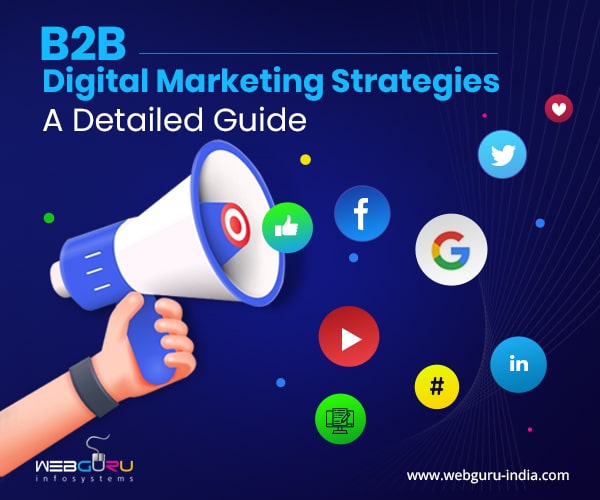
Crafting an effective marketing strategy can be challenging, as it involves balancing rapidly changing customer demands, ever-increasing competition, and the need to boost your growth on a budget. One of the most crucial elements of effective marketing is choosing your channels smartly, so you can reach your targeted audience properly. The first step to this is correctly identifying your target audience.
Target audiences can broadly be classified into 2 categories – individual consumers and businesses. Enterprises that deal with businesses only are classified as B2B or Business-to-Business. They may include software solution providers, consultancy services, hardware infrastructure providers, and many more.
In this article, we will discuss marketing to businesses, popularly known as B2B marketing through the help of digital marketing channels. We will discuss the steps involved in B2B digital marketing and also share the latest trends and best practices. Whether you execute them on your own or hire professional digital marketing services, this article will definitely help you to define your strategies and action plan.
What is B2B Marketing?

B2B marketing is about promoting and selling products or services among business enterprises. It is different from B2C (Business-to-Consumer) marketing involving the selling of products or services to the consumers directly.
B2B marketing deals with businesses, organizations, and other entities as potential customers. The primary focus of B2B companies is to enable client businesses to grow faster and function more efficiently. In B2B marketing, the tactics and strategies are designed to offer solutions to challenges the client businesses might face.
B2B marketers focus on building long-term relationships with other businesses, rather than simply making one-time sales. The sales cycle is often longer and more complex, as multiple decision-makers may be involved in the purchasing process. The average sales cycle for B2B is anywhere between 1 to 6 months.
How is It Different from B2C Marketing?
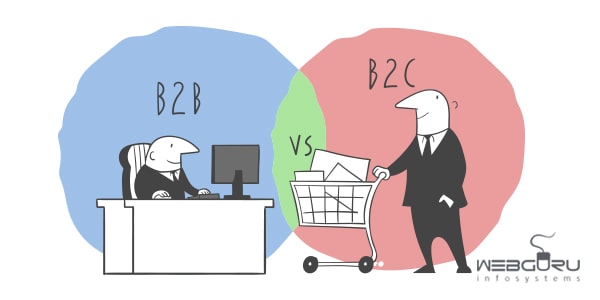
B2B and B2C (business-to-consumer) marketing are significantly different, as are their audiences and how they communicate with them. The marketing strategies may include conducting campaigns for mass-market advertising (print ads, TV commercials, and online banner ads) and social media and email marketing. B2C marketers often aim to appeal to consumers on an emotional level, using storytelling and creative visuals to engage their audience and attractive offers that will immediately hook them in.
The sales cycle in B2C marketing is often much shorter than in B2B marketing, as individual consumers tend to make purchase decisions more quickly. However, B2C marketers may also face highly intense competition and greater price sensitivity, as consumers have a wide range of options to choose from in many industries.
The table below shows the difference between B2B and B2C marketing:
| Key Differences | B2B Marketing | B2C Marketing |
| Target audience | Other businesses or organizations | Individual consumers |
| Purchase decision-making | Involves multiple decision-makers and a longer sales cycle | Typically involves a single decision-maker and a shorter sales cycle |
| Emphasis on relationship-building | Critical for building trust and establishing long-term relationships | Relationship-building is important, but may not be as critical |
| Marketing message | Emphasis on value and ROI | Emphasis on emotional appeal and offers |
| Content marketing | Emphasis on educational content and thought leadership | Emphasis on entertainment and engagement |
| Sales funnel | More complex and requires multiple touchpoints | More straightforward and can be completed in a few steps |
| Lead generation | Often driven by referrals and word-of-mouth | Often driven by targeted advertising and promotions |
| Branding | Emphasis on industry reputation and expertise | Emphasis on creating a strong brand identity and differentiation |
| Sales cycle | Typically longer and requires more relationship-building and personalized engagement | Typically shorter and requires more mass marketing and promotions |
It’s worth noting, however, that not all of these differences are always evident. Sometimes, some B2B and B2C strategies can also overlap in order to form an effective marketing strategy.
B2B Digital Marketing
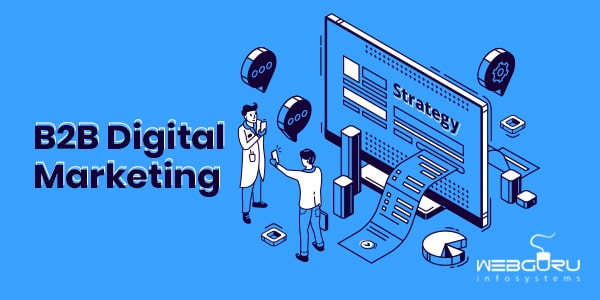
B2B digital marketing refers to the use of digital channels and technologies to market products or services to other businesses or organizations. B2B digital marketing is about the creation and distribution of digital content to the target audiences. Here, digital content may involve social media posts, blogs, webinars, videos, and newsletters. For any B2B digital marketing strategy, content marketing, email marketing, social media marketing, and search engine marketing play important roles.
B2B digital marketing is different from traditional B2B marketing, as it leverages digital platforms and technologies to reach customers and prospects where they spend most of their time – online. It focuses on establishing a brand’s credibility in the industry through thought leadership and success stories. This involves identifying target businesses/organizations/customers, understanding their needs and pain points, and developing tailored marketing messages and content that address those needs.
B2B digital marketing is able to reach highly precise and targeted audiences, which means that it is also highly measurable. Businesses may track the performance of their marketing campaigns and optimize their strategies over time. By analyzing data on website traffic, engagement rates, and conversion rates, businesses can identify areas for improvement and adjust their strategies to maximize results.
Steps involved in B2B Digital Marketing
Here is a brief outline of the various steps involved in B2B digital marketing.
1. Understanding Your Target Audience
Choosing your target audience to succeed in your B2B marketing campaign is essential. By creating buyer personas, businesses can understand the challenges, motivations, and pain points of their target audience. Understanding the buyer’s journey is equally important to map content to the buyer’s journey effectively. The buyer’s journey includes the awareness stage, consideration stage, and decision stage. Your marketing needs to effectively reach them at each of these stages to ensure that the conversion is finally created.
2. Creating a Digital Marketing Strategy
Defining goals and objectives is the foundation of a digital marketing strategy. The goals should be specific, measurable, achievable, relevant, and time-bound. Key performance indicators (KPIs) should be defined to measure the success of the campaign. Creating a budget is equally important to allocate resources effectively. Have a look at the most popular B2B digital marketing channels you can choose from:
a. Content Marketing – Content marketing is a critical tool for B2B businesses to build brand awareness and establish thought leadership in the industry. B2B companies can use blog articles, whitepapers, ebooks, infographics, and case studies as content types. Creating a content marketing plan should be based on understanding the target audience’s needs and pain points. When content is created on real issues that businesses face, your website will feature for them regularly and establish you as a source of reliable information on the subject.
In B2B marketing, it is important to note that video content is most sought after. Check out our full guide to video marketing to understand how you can leverage it yourself.
b. Email Marketing – Email marketing is a critical tool for B2B businesses to engage with the target audience and nurture leads. It should be made personalized and relevant, and have a clear call-to-action for the target audience. The email list should be segmented such that your CTAs reach the actual decision-makers of the And well-timed emails are of the utmost importance. Your chances of converting can be greatly increased by setting up multiple emails to be sent to prospective customers at different points in the sales cycle.
c. Social Media Marketing – Social media is an essential tool for engaging with target audiences and generating leads. You should choose the social media platforms for marketing depending on where your target audience is most active. Once you have identified the most effective channels, you can create a social media strategy based on defining goals and objectives, creating engaging content, and monitoring engagement metrics.
d. Search Engine Optimization (SEO) – It is a key tool to drive potential customers to the business website when they are in search of a solution to their problem. You need to carefully choose your target keywords so that they reflect the exact challenges faced by businesses that your services/products can solve. The company website should also be full of content that evokes trust and leadership. Achievement and success stories must be highlighted on the site in a professional manner. This will ensure that potential clients trust your expertise. Read our blog post on the best SEO practices to follow. It will help you know more about the technical aspects of SEO.
e. Pay-Per-Click (PPC) Advertising – Based on paid ad campaigns, this type of advertising is an essential tool to generate leads and increase website traffic. Creating a PPC campaign should be based on choosing the right keywords, ad targeting, and bidding strategies.
3. Analytics and Optimization
Analytics and optimization are critical to measuring the success of digital marketing campaigns. Measuring the success of a digital marketing campaign should be based on metrics and KPIs defined in the strategy. Optimization should be based on identifying areas for improvement and implementing changes to improve performance. A/B testing is a key tool to test the effectiveness of various elements in a digital marketing campaign.
4. Remarketing
It is a key tool to re-engage with visitors who have already shown interest in your products or services. Remarketing can be done through display ads, social media ads, video ads, and email marketing. Remarketing campaigns should be personalized, relevant, and have a clear call-to-action.
Trends to Look Out For in 2023
B2B marketing continues to evolve with new technologies and strategies emerging. Here are some trends to watch for:
1. Artificial Intelligence (AI) and Machine Learning (ML)
B2B marketers are increasingly using AI and ML to automate and optimize their marketing processes. This includes using predictive analytics to identify the most promising leads, creating personalized content and messaging, and automating routine tasks like email campaigns and social media posting.
2. Account-Based Marketing (ABM)
ABM is a targeted approach to B2B marketing that focuses on identifying and engaging with key decision-makers at specific target accounts. This involves creating personalized content and messaging for each account and using data-driven targeting to reach the right people at the right time.
3. Personalization
Personalization continues to be a key trend in B2B marketing, as businesses seek to create more relevant and engaging experiences for their target audience. This includes using data and analytics to personalize content, messaging, and offers based on individual preferences and behaviors.
4. Video Marketing
Videos have been very popular in B2B marketing for a while, as businesses look to create engaging and informative content that can be easily shared and consumed on social media and other digital platforms. They are now the most consumed type of content, and can be used by businesses to convey complex information in an easy-to-understand format. Also, short videos of 15-60 seconds long can be very useful in ensuring your brand stays at the forefront of your audience’s minds. Such videos can be used for remarketing to increase conversions.
5. Podcast marketing
Podcasts are gaining in popularity in the B2B world, as businesses look for new and engaging ways to reach their target audience. This involves creating branded podcasts that feature industry experts and thought leaders discussing relevant topics and providing insights and advice. Podcasts can be a great way to build brand awareness, establish thought leadership, and connect with potential customers in a more intimate and engaging format. As the popularity of podcasts continues to grow, we can expect to see more B2B companies investing in this medium to reach their target audience.
Conclusion
Your marketing strategies will only be effective if you keep your audience in mind. When it comes to B2B customers, you have to understand that the sales process is long, and studies have shown buyers tend to contact you only when they are 57% – 70% done with their research. They’re rarely short on options for services you may offer. So make sure your marketing strategies are focused on outlining why you are the best solution for them. And if your message doesn’t seem to be reaching your target audience, remodel your strategies based on the above trends and practices. To read more on how to make the best of your marketing efforts, check out our blog on the key parameters of a successful digital marketing campaign.
Digital marketing can be tricky and time-consuming. However, with enough patience and research, you too can see the rewards of your efforts. For even faster and more professional results, contact Webguru Infosystems! Being a B2B company ourselves, we are well aware of the ins and outs of B2B digital marketing.

Priyanka Agarwal
An expert digital marketer with vast knowledge in SEO, SMO, and the like, Priyanka Agarwal writes about the latest trends in digital marketing.
8 comments
Leave a Reply
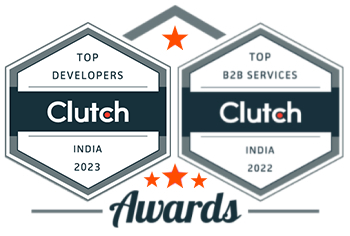
-
1000+
Happy
Clients -
25+
Countries
Served -
19+
Years of
Trust
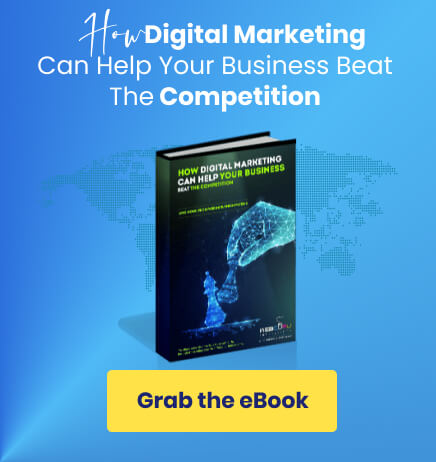

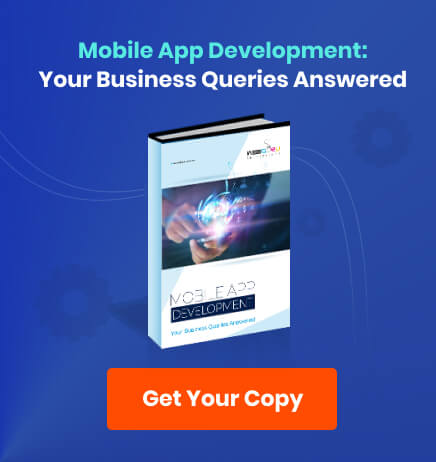





Nice guideline. Amaizing blog
I found this blog post to be very informative and helpful for anyone looking to improve their B2B digital marketing efforts. The content is well-written, easy to understand, and provides actionable insights that can be applied in real-life situations. I would definitely recommend this post to anyone interested in B2B digital marketing.
A thorough article on B2B digital marketing strategies. I will definitely share this with the concerned people.
For today’s businesses, the need of the hour is to spend money where maximum returns can be expected. The blog explains how businesses can create a powerful digital marketing strategy for success. Kudos to the writer.
Great read. The blog explains all the important points that we should know about B2B marketing.
Nice read. The blog offers a detailed analysis of B2B marketing and also shares the latest trends and best practices. Loved the insights shared here.
Thank you for sharing this insightful post. I found it to be engaging and informative. Keep up the excellent work.
Well written post.